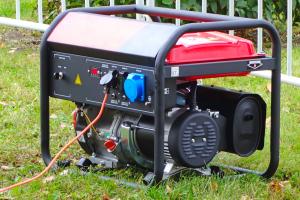The safest way to use a generator at home

Whether it’s a storm, a power company outage or wires down from an accident, when the power goes out, the generator goes on. It’s a modern convenience, but one that also comes with risk. The hazards you should be aware of are; carbon monoxide (CO) poisoning from the toxic engine exhaust, electrical shock or electrocution, and fire. Follow these generator tips to stay safe and avoid damaging your home.
- Make sure to use the right generator to meet your needs. Read the instructions to avoid overloading, causing it to overheat or break down.
- Never run a generator indoors or in an enclosed space. Your generator should be at least 15 feet from your home and away from windows and doors.
- Don’t run a portable generator in the rain or manage one with wet hands. It’s important to keep the generator dry to avoid electrocution.
- If you think you’ll need to use your gas-powered generator for an extended period of time, make sure to keep a supply of gas on hand. It should be stored properly in a safety can, away from living areas and fuel-burning appliances.
- Generators, especially portable ones, become hot when being used, so let it cool down before you refuel. Adding gas to a hot piece of machinery poses a risk of a fire starting or burning yourself.
- Plug appliances directly into the generator or use a heavy-duty extension cord, rather than a wall outlet. Plugging your generator into the wall puts utility workers, your neighbors and your household at risk of electrocution. This is commonly known as “backfeeding”.
- Because there is a risk of carbon monoxide poisoning when using a generator, make sure to test the batteries on your CO alarms. This way, the carbon monoxide can be detected and you can quickly get outside into the fresh air.
- Check your generator regularly when it’s in use and never leave it running when you aren’t home.
- When in doubt, turn to a professional. Should you have installation questions, it is best to bring in a professional electrician when handling a generator.
According to the Consumer Product Safety Commission, generator mishaps result in 50 fatalities each year. That’s why it’s imperative that you know how to safely operate your generator.
Protect your property
Talk with your independent insurance agent about your home insurance coverage to make sure you have the right coverage should the unexpected occur when you are running your generator.
Sources:
Consumer Reports
Red Cross
The recommendation(s), advice and contents of this material are provided for informational purposes only and do not purport to address every possible legal obligation, hazard, code violation, loss potential or exception to good practice. The Hanover Insurance Company and its affiliates and subsidiaries (“The Hanover”) specifically disclaim any warranty or representation that acceptance of any recommendations or advice contained herein will make any premises, property or operation safe or in compliance with any law or regulation. Under no circumstances should this material or your acceptance of any recommendations or advice contained herein be construed as establishing the existence or availability of any insurance coverage with The Hanover. By providing this information to you, The Hanover does not assume (and specifically disclaims) any duty, undertaking or responsibility to you. The decision to accept or implement any recommendation(s) or advice contained in this material must be made by you.
LC 2018-423
Related resources
The safest way to use a generator at home
Whether it’s a storm, a power company outage or wires down from an accident, when the power goes out, the generator goes on. It’s a modern convenience, but one that also comes with risk. The hazards you should be aware of are; carbon monoxide (CO) poisoning from the toxic engine exhaust, electrical shock or electrocution, and fire. Follow these generator tips to stay safe and avoid damaging your home.
- Make sure to use the right generator to meet your needs. Read the instructions to avoid overloading, causing it to overheat or break down.
- Never run a generator indoors or in an enclosed space. Your generator should be at least 15 feet from your home and away from windows and doors.
- Don’t run a portable generator in the rain or manage one with wet hands. It’s important to keep the generator dry to avoid electrocution.
- If you think you’ll need to use your gas-powered generator for an extended period of time, make sure to keep a supply of gas on hand. It should be stored properly in a safety can, away from living areas and fuel-burning appliances.
- Generators, especially portable ones, become hot when being used, so let it cool down before you refuel. Adding gas to a hot piece of machinery poses a risk of a fire starting or burning yourself.
- Plug appliances directly into the generator or use a heavy-duty extension cord, rather than a wall outlet. Plugging your generator into the wall puts utility workers, your neighbors and your household at risk of electrocution. This is commonly known as “backfeeding”.
- Because there is a risk of carbon monoxide poisoning when using a generator, make sure to test the batteries on your CO alarms. This way, the carbon monoxide can be detected and you can quickly get outside into the fresh air.
- Check your generator regularly when it’s in use and never leave it running when you aren’t home.
- When in doubt, turn to a professional. Should you have installation questions, it is best to bring in a professional electrician when handling a generator.
According to the Consumer Product Safety Commission, generator mishaps result in 50 fatalities each year. That’s why it’s imperative that you know how to safely operate your generator.
Protect your property
Talk with your independent insurance agent about your home insurance coverage to make sure you have the right coverage should the unexpected occur when you are running your generator.
Sources:
Consumer Reports
Red Cross
The recommendation(s), advice and contents of this material are provided for informational purposes only and do not purport to address every possible legal obligation, hazard, code violation, loss potential or exception to good practice. The Hanover Insurance Company and its affiliates and subsidiaries (“The Hanover”) specifically disclaim any warranty or representation that acceptance of any recommendations or advice contained herein will make any premises, property or operation safe or in compliance with any law or regulation. Under no circumstances should this material or your acceptance of any recommendations or advice contained herein be construed as establishing the existence or availability of any insurance coverage with The Hanover. By providing this information to you, The Hanover does not assume (and specifically disclaims) any duty, undertaking or responsibility to you. The decision to accept or implement any recommendation(s) or advice contained in this material must be made by you.
LC 2018-423
Related resources
The safest way to use a generator at home
Whether it’s a storm, a power company outage or wires down from an accident, when the power goes out, the generator goes on. It’s a modern convenience, but one that also comes with risk. The hazards you should be aware of are; carbon monoxide (CO) poisoning from the toxic engine exhaust, electrical shock or electrocution, and fire. Follow these generator tips to stay safe and avoid damaging your home.
- Make sure to use the right generator to meet your needs. Read the instructions to avoid overloading, causing it to overheat or break down.
- Never run a generator indoors or in an enclosed space. Your generator should be at least 15 feet from your home and away from windows and doors.
- Don’t run a portable generator in the rain or manage one with wet hands. It’s important to keep the generator dry to avoid electrocution.
- If you think you’ll need to use your gas-powered generator for an extended period of time, make sure to keep a supply of gas on hand. It should be stored properly in a safety can, away from living areas and fuel-burning appliances.
- Generators, especially portable ones, become hot when being used, so let it cool down before you refuel. Adding gas to a hot piece of machinery poses a risk of a fire starting or burning yourself.
- Plug appliances directly into the generator or use a heavy-duty extension cord, rather than a wall outlet. Plugging your generator into the wall puts utility workers, your neighbors and your household at risk of electrocution. This is commonly known as “backfeeding”.
- Because there is a risk of carbon monoxide poisoning when using a generator, make sure to test the batteries on your CO alarms. This way, the carbon monoxide can be detected and you can quickly get outside into the fresh air.
- Check your generator regularly when it’s in use and never leave it running when you aren’t home.
- When in doubt, turn to a professional. Should you have installation questions, it is best to bring in a professional electrician when handling a generator.
According to the Consumer Product Safety Commission, generator mishaps result in 50 fatalities each year. That’s why it’s imperative that you know how to safely operate your generator.
Protect your property
Talk with your independent insurance agent about your home insurance coverage to make sure you have the right coverage should the unexpected occur when you are running your generator.
Sources:
Consumer Reports
Red Cross
The recommendation(s), advice and contents of this material are provided for informational purposes only and do not purport to address every possible legal obligation, hazard, code violation, loss potential or exception to good practice. The Hanover Insurance Company and its affiliates and subsidiaries (“The Hanover”) specifically disclaim any warranty or representation that acceptance of any recommendations or advice contained herein will make any premises, property or operation safe or in compliance with any law or regulation. Under no circumstances should this material or your acceptance of any recommendations or advice contained herein be construed as establishing the existence or availability of any insurance coverage with The Hanover. By providing this information to you, The Hanover does not assume (and specifically disclaims) any duty, undertaking or responsibility to you. The decision to accept or implement any recommendation(s) or advice contained in this material must be made by you.
LC 2018-423
Related resources
The safest way to use a generator at home
Whether it’s a storm, a power company outage or wires down from an accident, when the power goes out, the generator goes on. It’s a modern convenience, but one that also comes with risk. The hazards you should be aware of are; carbon monoxide (CO) poisoning from the toxic engine exhaust, electrical shock or electrocution, and fire. Follow these generator tips to stay safe and avoid damaging your home.
- Make sure to use the right generator to meet your needs. Read the instructions to avoid overloading, causing it to overheat or break down.
- Never run a generator indoors or in an enclosed space. Your generator should be at least 15 feet from your home and away from windows and doors.
- Don’t run a portable generator in the rain or manage one with wet hands. It’s important to keep the generator dry to avoid electrocution.
- If you think you’ll need to use your gas-powered generator for an extended period of time, make sure to keep a supply of gas on hand. It should be stored properly in a safety can, away from living areas and fuel-burning appliances.
- Generators, especially portable ones, become hot when being used, so let it cool down before you refuel. Adding gas to a hot piece of machinery poses a risk of a fire starting or burning yourself.
- Plug appliances directly into the generator or use a heavy-duty extension cord, rather than a wall outlet. Plugging your generator into the wall puts utility workers, your neighbors and your household at risk of electrocution. This is commonly known as “backfeeding”.
- Because there is a risk of carbon monoxide poisoning when using a generator, make sure to test the batteries on your CO alarms. This way, the carbon monoxide can be detected and you can quickly get outside into the fresh air.
- Check your generator regularly when it’s in use and never leave it running when you aren’t home.
- When in doubt, turn to a professional. Should you have installation questions, it is best to bring in a professional electrician when handling a generator.
According to the Consumer Product Safety Commission, generator mishaps result in 50 fatalities each year. That’s why it’s imperative that you know how to safely operate your generator.
Protect your property
Talk with your independent insurance agent about your home insurance coverage to make sure you have the right coverage should the unexpected occur when you are running your generator.
Sources:
Consumer Reports
Red Cross
The recommendation(s), advice and contents of this material are provided for informational purposes only and do not purport to address every possible legal obligation, hazard, code violation, loss potential or exception to good practice. The Hanover Insurance Company and its affiliates and subsidiaries (“The Hanover”) specifically disclaim any warranty or representation that acceptance of any recommendations or advice contained herein will make any premises, property or operation safe or in compliance with any law or regulation. Under no circumstances should this material or your acceptance of any recommendations or advice contained herein be construed as establishing the existence or availability of any insurance coverage with The Hanover. By providing this information to you, The Hanover does not assume (and specifically disclaims) any duty, undertaking or responsibility to you. The decision to accept or implement any recommendation(s) or advice contained in this material must be made by you.
LC 2018-423





